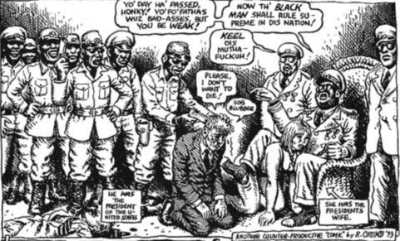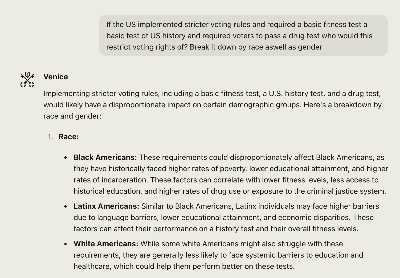>>4263I will be a bit vague: Yes, some people you're reading on the internet do really want Hitler. Some want Stalin, in fact. Many others would balk at a charismatic strongman. That's not a fashionable solution. They think there are much more sound alternatives to the present state of things.
I'll talk about Curtis Yarvin and Bronze Age Pervert, even if I'm not an expert on them.
Curtis Yarvin suggests that when we ask people, "Do we live in a democracy, and should we?", you're going to get a hesitant, qualified response on the first half, and an emphatic, "Yes!" on the second. But so, could or should that democracy be the American civics textbook ideal? Maybe. Since not many would give a firm, positive to the first question, "democracy" is probably not the system under which Americans live at present. So, we need to redefine democracy as something that does not accord with our popular definition, which looks illiberal or elitist. Monarchy can be democratic, after all. And the Chinese live in a democracy, they say. The Communist Party didn't win power because they killed all the democrats, but because they sold themselves as the true democrats, even if their understanding of these terms is more classical than our own popular understanding of that word. There is a reason Curtis Yarvin talks so much about FDR, who took power as a democrat.
This is what Bronze Age Pervert is getting at, too. I don't know if he's actively calling for military dictatorship in America. Is he? His solution is somehow democratic, too, if you abandon the present definition of the word and hostility against elitism and so on.
So, you can pull from the writings of Curtis Yarvin and Bronze Age Pervert a modernized revolutionary scheme, a program for what comes next, and arguments for why these things need to be done.
I'm not trying to be dismissive, since perhaps I'm still missing something, but the way I see it is this: No, at the present, leaving aside how it might be done, simply restricting suffrage to a small minority of citizens would not work.
Retarded, poor, foreign-born people vote at fairly low rates already.
Legally disenfranchising more than half the electorate, which is what an IQ test and requirements for American-born parents would do, wouldn't solve the problems that plague the present system (the accounts of these would be different for a progressive than for a Yarvinite, but not fundamentally). If major reforms were carried out simultaneously, this new electoral bloc is, anyway, not naturally an elite in waiting, and would be given power they didn't desire. They could not for long resist powers arrayed against them.

